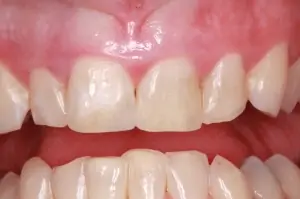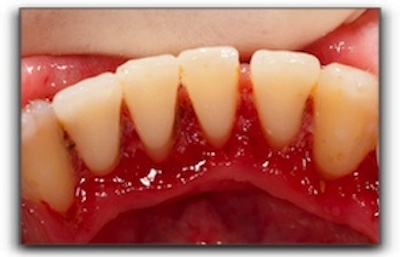Gum Disease Treatment in Anchorage and Wasilla, AK

It is estimated that over 50% of Americans over the age of 30 are affected by some form of periodontal disease. Gum disease is a condition characterized by gums that are red and bleed easily, persistent bad breath, gums that are pulled away from the teeth, changes in your bite, loose teeth and/or bone loss.
Periodontal disease occurs when your gum tissue becomes infected by bacteria. This infection can be isolated to your gums, which is referred to as gingivitis, or spread beyond the gums to the ligaments and bone.
What are the Causes of Periodontal Disease?

Periodontal disease is the result of dental plaque, a sticky film composed primarily of bacteria. Your body’s immune system, which is designed to fight infection, will attempt to battle this bacteria as it grows below the gum line. Toxins produced by the bacteria in the plaque, along with your immune system, will start to break down the ligaments and bone that hold your teeth in place.
Periodontal disease is a common but largely preventable disease as it is typically the result of poor oral hygiene. Brushing and flossing daily, along with regular dental visits is the best way to prevent and successfully treat gum disease. Some additional factors which can also increase your risk for developing gum disease include:
- Smoking and Chewing Tobacco – tobacco products contain numerous toxic chemicals which interfere with the normal function of your immune system. The heat caused by smoking also decreases blood circulation in the gums, thus reducing the ability of your gum tissue to fight infection.
- Stress – chronic stress exposes your body to a continuous stream of stress hormones that suppress the immune system.
- Prescription Medications – many medications have side effects that reduce salivary flow, resulting in xerostomia, or dry mouth, which encourages bacteria to spread more easily. Be sure to always discuss your prescription medications with your dental providers.
- Poor Nutrition – a diet high in sugar and carbohydrates actually feeds the bacteria that cause gum disease. If your diet lacks certain vitamins, especially Vitamin C, you are also more likely to experience trouble with your gums. To help prevent the development of gum disease, drink plenty of water and make sure you eat a sensible diet rich in Vitamin C.
- Hormonal Changes – During pregnancy it is estimated up to 60% of women will experience inflammation due to fluctuating hormone levels which increase the blood flow to your gums, causing them to be increasingly sensitive and swollen. Puberty gingivitis is usually the result of elevated hormone levels and poor dental hygiene habits.
- Systemic Conditions – If you have an inflammatory disease such as diabetes, arthritis, HIV, or heart disease, you have an increased likelihood of also having inflamed and bleeding gums.
What are the Symptoms of Periodontal Disease?
Symptoms of gum disease include:

- Red and inflamed gums
- Tenderness
- Bleeding
- Pain with chewing
- Halitosis, or bad breath
- Sensitive teeth
- Loose teeth
- Receding gums
How to treat Periodontal Disease/Non-Surgical Gum Treatment

Your gums, ligaments, and bone form the foundation for your teeth. When that foundation is not healthy, it jeopardizes your teeth and health just as a bad support system would threaten the stability of a house.
Signs of periodontal disease include: gums that are red and bleed easily, persistent bad breath, gums that are pulled away from the teeth, changes in your bite and loose teeth. Any of these may be signs of a serious problem and if left untreated may result in surgery and/or extraction. This is why it is so important to address periodontal disease at the first sign of a problem, however, it may be possible to return diseased gum tissue to a healthy state with the proper treatment!
Treatment for periodontal disease often involves a non-surgical periodontal therapy known as scaling and root planing. This procedure is frequently completed under a local anesthetic to ensure you are comfortable throughout your appointment.
Contact Alaska Premier Dental Group Today
If you are experiencing any of the conditions listed above, call today to schedule an evaluation with one of our experienced hygienists.
It’s easy to regain your health here at Alaska Premier Dental Group, serving both the Anchorage and Wasilla communities. Give us a call today to begin your health journey!

